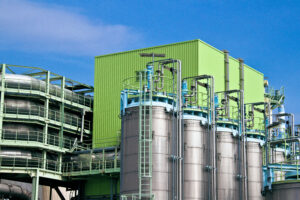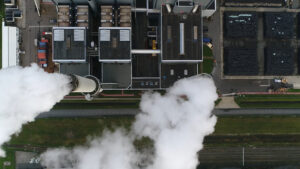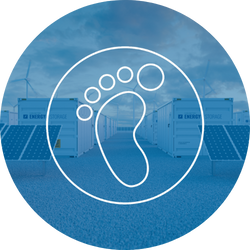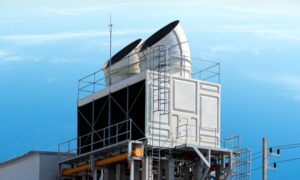Understanding Carbon Capture & Storage
What is Carbon Capture?
Carbon capture is a technology designed to capture carbon dioxide (CO2) emissions from energy generation and industrial processes. This innovative approach involves capturing CO2 at its emission source, transporting it, and then permanently storing it underground, or using it in various applications. The primary aim is to prevent CO2 from entering the atmosphere, and thereby mitigating its effects on the climate.
How does Carbon Capture work?
The carbon capture process typically follows 3 essential steps:
- Capture: This initial phase involves capturing CO2 from various sources such as thermal power and anaerobic digestion plants, or industrial factories and mills. There are several technologies used for capturing CO2, including pre-combustion, post-combustion, and oxy-fuel combustion. Each method has its own advantages and is selected based on the specific requirements of the emission source.
- Transport: Once captured, the CO2 is compressed and transported to a storage site. This is usually done via pipelines, but shipping and road transport can also be considered for smaller quantities and remote locations.
- Storage: Finally, the captured CO2 is stored in geological formations, such as old oil and gas fields or deep saline aquifers.
The importance of Carbon Capture
Carbon Capture has significant potential in the effort to achieve sustainability for a number of key reasons:
Reduction of Greenhouse Gas Emissions: By capturing CO2 emissions from energy generation and industrial sources, carbon capture significantly reduces the amount of greenhouse gases released into the atmosphere and can therefore help to achieve the goal of reducing greenhouse gas emissions by 80% by 2050.
Facilitating the Transition to Clean Energy: Carbon capture can play a crucial role in the transition to renewable energy sources by providing a solution for industries that are challenging to decarbonise or extremely energy intensive, helping to both maintain and retain exisiting industries in the UK and Ireland
Economic Opportunities: The development and deployment of carbon capture technologies can create new economic opportunities, including investment, upgrades to existing facilities, and job creation.


Challenges and Future Prospects
Despite its potential, carbon capture faces several challenges:
- High Costs: The technology and infrastructure required for carbon capture are expensive, which can be a barrier to widespread adoption.
- Storage Concerns: Ensuring the safe and permanent storage of captured CO2 is crucial, as any leakage could negate the benefits of the capture process.
- Public Perception: There is a need for greater public awareness and acceptance of carbon capture technologies to gain the necessary support for its implementation.
Looking ahead, advancements in technology and increased investment could help overcome these obstacles, making carbon capture a standard part of the energy mix and integral player in the overall energy transition. As we continue to seek greener solutions, carbon capture stands out as a promising tool in the collective effort to create a more sustainable and resilient future.
How can Fichtner support your Carbon Capture Project?
The Fichtner Group has been instrumental in the development and delivery of some of the world’s first post-combustion carbon capture plants, and we are now at the forefront of supporting many of the leading carbon capture projects across the UK and Ireland. Our expertise encompasses a wide range of engineering and consulting services tailored to meet the unique needs of our clients:
- Feasibility Studies: Our team can provide comprehensive feasibility studies to assess the technical and economic viability of carbon capture projects, supporting our clients in making informed decisions.
- Technical Advice: Our team includes industry leaders in the understanding of carbon capture systems, so we can ensure concepts are efficient, effective, and tailored to the specific emissions source.
- Owners Engineer: With our extensive experience in project management, we can oversee the entire lifecycle of carbon capture projects, from initial planning through to development and operation.
- Environmental Support: Our consultants can provide guidance on regulatory compliance and environmental assessments, ensuring that projects meet all legal requirements and are environmentally responsible.
Having played a significant role in achieving a number of key milestones in the UK’s carbon capture sector, we are dedicated to leveraging our experience to assist our clients in effectively advancing carbon capture technologies. For more information on how we can support your carbon capture projects, please reach out to us here: Contact us – Fichtner – Engineering Consultants UK













